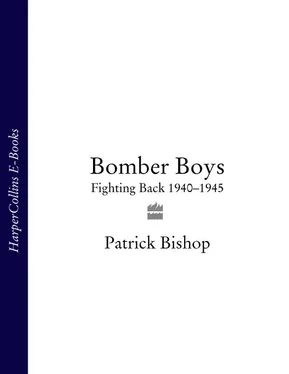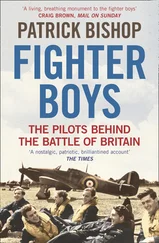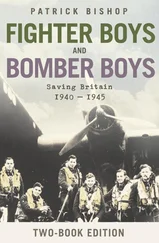The authorities continually proclaimed the effectiveness of Bomber Command’s actions. Early communiqués created an illusion of extraordinary efficiency, of bombs slanting down on strictly military targets with scientific precision. This optimistic view was based largely on the reports of the pilots dropping the ordnance, an unreliable measure as it was to turn out. It was only after two years of war, when a report based on an analysis of aerial photographs revealed the hopeless inaccuracy of most bombing, that tactics and equipment improved and the gap between reality and propaganda began to close. By the end of the war Bomber Command could obliterate any target it wished to and did so, sometimes flattening towns whose military importance was minuscule. But the value of such destruction was always open to question and afterwards there was disagreement over what it was that Bomber Command had achieved.
Harris lived another forty years after the last bomb was dropped. Right until his death he fought to persuade the world that his Command’s contribution to victory had been decisive. His arguments were based not so much on the data provided by the American and British official surveys of damage conducted after the war, but more on the word of Hitler’s munitions minister, the silky and self-interested Albert Speer. The surveys themselves failed to settle the arguments that raged throughout the war over how bomber power should be applied and started a new round of controversy. The questions of how much material harm bombing did to the German war effort, and whether the energy and sacrifices involved were worth it, have never been fully answered and never will be.
It was even more difficult to determine the psychological effect of bombing. Bombs were spiritual as much as physical weapons. Air strategists had been arguing since aeroplanes were invented that the moral power of bombing was as great as anything it did to factories or homes, perhaps much greater. By destroying the will of workers to work, air attacks could do as much effective damage as they did when they smashed up a steelworks or assembly line.
This convenient belief grew as it became clear that pre-war assumptions about bombing accuracy were absurdly optimistic. The first bombs were aimed at small targets and hit nothing. Better then to aim at a large target and hit something – anything – for in a built-up area no bomb would be wasted. Even if a bomb missed the factory it was aimed at, the chances were it would hit the home of someone who was employed there. It might kill him and his family. Death or fear of death would keep him away from work. If enough bombs were dropped, so the theory ran, workers might eventually turn against their rulers and force them to stop fighting.
Even before the war the evidence available from the German and Italian bombardments of Madrid and Barcelona suggested that this was not necessarily so. Britain’s own experience of the Blitz pointed to a more startling conclusion: that aerial bombardment could actually toughen resolve and deepen resistance. For much of the war, there was a prevailing belief that Germany would crack if only it was hit hard and often enough. The RAF’s pre-war professional judgement that in a totalitarian state, coercion trumped public opinion, was soon forgotten in the desperation to achieve results.
The lack of any accurate understanding of what the campaign was achieving was characteristic of the oddly disconnected way in which the war was waged. Even those dropping the bombs felt they were engaged in a surreal exercise. Looking down from a Lancaster or Halifax at Essen or Berlin from 20,000 feet you saw nothing that connected you to the earth you knew, only a diabolical son et lumière of smoke and fire. ‘I would try to tell myself … that this was a city,’ wrote Don Charlwood, an Australian navigator with 103 Squadron. ‘A place with the familiar sights of civilization. But the thought would carry little conviction. A German city was always this, this hellish picture of flame, gunfire and searchlights, an unreal picture because we could not hear it or feel its breath. Sometimes when the smoke rolled back and we saw streets and buildings I felt startled. Perhaps if we had seen the white, upturned faces of people, as over England we sometimes did, our hearts would have rebelled.’ 8
Harris liked to call the successive phases of the air war ‘battles’. There was a Battle of Hamburg, a Battle of the Ruhr, a Battle of Berlin. But they were not battles as most people understood the word. There was not one enemy, waiting and visible, but many. The crews were constantly at the mercy of the weather and mechanical failure. On the approach routes and over the targets they faced searchlights, flak and night-fighters. There was no relaxation on the way home. The last minutes were sometimes as dangerous as the time over target as the skies above the base filled with aircraft, many of them sieved with flak and cannon holes, clinging to the air with their last few gallons of petrol, praying for the signal to touch down.
Flying in bombers was an extraordinarily dangerous activity. Harris, with his usual harsh honesty, asked people to bear in mind that ‘these crews, shining youth on the threshold of life, lived under circumstances of intolerable strain. They were in fact – and they knew it – faced with the virtual certainty of death, probably in one of its least pleasant forms.’ 9
Altogether 55,573 Bomber Command aircrew – British, Canadian, Australian, New Zealanders and others – were killed. That is out of a total of 125,000 who served. Another 8,403 were wounded and 9,838 taken prisoner. In simple terms that means 44.4 per cent of those who flew, died. The real picture was rather grimmer. Many of those included in the overall aircrew figure were still training when the war ended and never saw action. According to one study, the true figure is closer to 65 per cent. The chances of death then, were appallingly high, far higher than those facing soldiers and sailors. The life expectancy of an airman was considerably shorter even than that of a junior infantry officer on the Western Front in 1916. 10To Peter Johnson who swapped a cushy instruction post for operational flying, the enterprise sometimes seemed like the Charge of the Light Brigade, over and over again.
It was no wonder that crews discussed obsessively the odds on their survival and tried to discern some pattern in the tapestry of death. It was very confusing. Some ‘sprog’ crews fresh from a training unit got the ‘chop’ first time out. But so did veterans on their last but one trip of their thirty-operation tour. Good pilots died inexplicably and poor ones blundered through. It was all down to luck and Lady Luck, capricious tart that she was, had to be wooed and cosseted constantly. The modern young men in the bombers were as superstitious as mediaeval peasants. Final preparations would be thrown into chaos if someone lost his lucky silk stocking or remembered he had forgotten a pre-operation ritual. They also developed a mediaeval fatalism. Flying was ‘dicing’ and death was ‘the reaper’.
But despite death’s towering presence, it could still seem curiously remote. It was a common experience to see an aeroplane just like your own, ahead of you in the bomber stream, suddenly explode as flak ignited hundreds of gallons of petrol and thousands of pounds of explosive. It was not unusual to watch as a night-fighter nosed upwards beneath the pregnant belly of an unsuspecting neighbour and with one squirt of its vertically-directed guns sent it screaming down.
After witnessing these dreadful sights, crews were often struck by the complexity and selfishness of their feelings. ‘Suddenly,’ wrote Harry Yates, a Lancaster pilot, ‘ahead of us in the stream a vic of three kites was consumed in a prodigious burst of flame which immediately erupted outwards under the force of the secondary explosion. The leader had been hit in the bomb bay, the others were too close. No one could have survived, I knew. There was no point in looking for parachutes. I flew on straight and level, Tubby standing beside me, both of us dumbstruck by the appallingly unfair swiftness and violence of it all. But there was still that deeply-drawn breath of relief that somebody else, and not oneself, had run out of luck. And hard on the heels of that was a pang of guilt. One grieved for whoever was in the kites and wondered if friends might not be coming home …’ 11
Читать дальше












